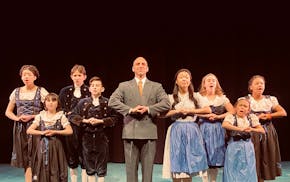Upper Midwest Scandinavians are supposed to be stoic and phlegmatic. And those depicted in "Sweet Land the Musical" are, to a degree. Still, they pour out their hearts and inner lives in song in an understated love story that evinces some of the hard prejudice in Minnesota farm country.
That these characters share their emotions is not the only surprise in this mixed two-act production that premiered Saturday at St. Paul's History Theatre. Directed competently by Perrin Post, who also co-wrote the book with lyricist Laurie Flanigan-Hegge, "Sweet Land" may not always knock your socks off. But the show, which stars Ann Michels, has plenty of charm. And composer Dina Maccabee's music is often evocative, poignant and, yes, sweet.
Based on Ali Selim's 2005 film of the same name and the Will Weaver short story that inspired it, "Sweet Land" is set a century ago, but has contemporary parallels. An immigrant who speaks little English is ostracized in her new community, but forges ahead in hopes she will gain acceptance.
In this case, the newcomer is a German woman, Inge Altenberg (Michels), sent from Norway in 1920 to Minnesota to marry farmer Olaf (Robert O. Berdahl). Anti-German sentiment is still raw from World War I, and the local priest (Michael Gruber), who is something of a moral tyrant, refuses to marry them. He gets the community to shun the unmarried couple. Things change when Olaf tries to help best friends Frandsen (Jon Andrew Hegge) and Brownie (Tinia Moulder), whose farm is being foreclosed.
The performances are uneven. In her excellent turn, Michels imbues Inge with common sense and a lot of strength. But she's not well-matched with Berdahl, an otherwise strong performer who may have been miscast. Hegge and Moulder have better chemistry as a couple, and give the show much of its comic buoyancy.
The action takes place on Erica Zaffarano's good-looking scenic design, subtly lit by Mike Grogan to show beautiful cathedral skies. "Sweet Land" may be improved with revisions, especially the lyrics, which feature a lot of trite, end-stopped rhymes. (Public service announcement to poets, rappers and book writers: Never go for obvious rhymes like "love" and "above"; find something new to say.)
The music, ranging from folksy to romantic and smartly arranged by Robert Elhai, benefits from the supple onstage band that sometimes doubles as town characters. The musicians serve as witnesses to a story that bears retelling.

A former deli maestro steps into Capt. von Trapp's shoes in Artistry's 'Sound of Music'

NPG vets Michael Bland and Sonny Thompson extend their brotherhood into a post-Prince duo

